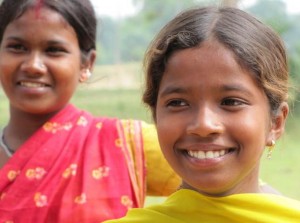Micro-land ownership for India's Landless Agricultural Laborers, Landesa, India
The micro-land ownership program strives to reduce poverty through improved homestead development in Odisha and West Bengal. The project works through local communities and government to assist with allocation or regularization of land and also provides assistance with housing and basic inputs (seeds), capacity building in homestead food production and promotes local development of roads, water, terrain leveling etc.
- including women’s name on pattas (land rights documents);
- including daughter’s names as co-inheritors on pattas;
- training and guidance on livelihood strategies that explicitly address women’s needs and constraints;
- community conversations designed to help the community gain a better understanding of the interconnected social norms that effectively devalue girls limit their ability to acquire assets, including land. The community conversations are designed to facilitate the generation of bottom-up actions that will promote dowry free marriages, delay of marriage, and girls inheritance rights to land;
- a supportive group mechanism by which boys and girls groups meet regularly and cover a curriculum especially designed to help them understand the relationship between the value of girls, dowry, early marriage, domestic violence, trafficking, and land ownership and economic capabilities; and,
- prioritizing the allocation of micro-plots to landless and homesteadless families who have daughters and no sons
- GAAP core team members working with Landesa: Amber Peterman, Ruth Meinzen-Dick
Resources:
- Power Point presentation from final technical workshop - January 2013
- Project Note - "Can Microplots Contribute to Rural Households' Food Security? Evaluation of a Gender-Sensitive Land Allocation Program in West Bengal, India"
- Discussion Paper - "Can Government-Allocated Land Contribute to Food Security? Intrahousehold Analysis of West Bengal's Microplot Allocation Program" - December 2013
